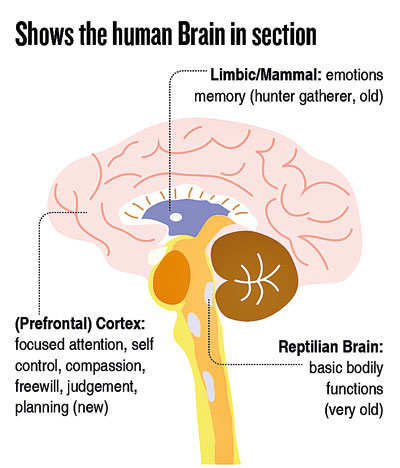Sunday Times 2
Conditioned Self in Buddhism: What neuroscience says
View(s):By Dr. Channa Ratnatunga
Nature is a reality. A set of natural laws governs its manifestations. To date, man has discerned some. The major breakthroughs include Corpernicus’s description of a heliocentric solar system and Darwin’s concept of Natural Selection leading to the Evolution of Species. Several others, like Newton and Einstein, have also shattered the existent opinion by making significant insightful contributions to our understanding of nature’s external reality. The unquenched thirst for new frontiers and paradigms of thought will continue to lead man’s quest for an understanding of true reality. Cognisant of the natural shortcomings of his sensorial apparatus, he does and will keep depending on the ever-expanding technological frontiers of the future.
Gautama the Buddha’s contribution by inward reflection to discern the internal reality that interprets the external reality, made some 2500 years ago as subjective revelation, remains the most significant contribution of perception of both internal and external realities and its methodology of interpretation as yet. Modern science, using current advanced technology, is gradually coming to grips with the truth of what he propounded more than two millennia ago.

Man’s cerebral pedigree has a residue of his animal past. This caters to his basic needs such as breathing, his satiety needs and thermoregulation, and it caters to the flight or fight reflex for survival. These occur in the reptilian brain (see Fig.), ensconced at the base of the brain. The latter, together with the later-developed limbic system that harbours the emotional brain (the Amygdala) is regulated by the front of the cortex (Prefrontal) of the brain. Freud’s so-called id, or Jung’s ‘shadow’ could fall into this category. This is essentially a survival and procreative reflex that needs regulation in the nascent Self that becomes an integral part of the ‘being’. Social needs secure relative degrees of regulation.
From early childhood to adulthood, a neuronal framework (Default Mode Network (DMN)) develops the ‘Self’. The changes that occur in the brain are described in neuroscience as neuroplasticity. Hence, the ‘Self’ becomes conditioned by the experience of the ‘being’ throughout his sojourn on Earth. It is the Atta in Buddhist philosophy. It commits kammic acts for its instinctual survival. The Buddha preached to stay away from Atta, i.e., Anatta. For Atta creates kamma, which in turn leads to the ever-present Law of Conditionality (Paticca Sammupada) to prolong the Sansaric existence with its intrinsic sorrow.
By not ruminating about the past or worrying about the future, hence not reinforcing the DMN, i.e., the I or the narrative me (the Conditioned Self) and living in the ‘now’ facilitates another brain network of neurons, the Central Executive Network (CEN). The latter is promoted by persistent mindful meditation, i.e., Vipassana Bhavana, which in turn attenuates the DMN, the Self.
The above has been corroborated by neuroscience technology using functional MRI (fMRI) scans on meditating monks with years of experience in Vippassana Bhavana from Tibet.
For further details, read my 150-page book in colour ‘Buddhist Philosophy and Neuroscience’ reprinted by popular demand, priced at Rs 800 and available at BPS Kandy and Sarasavi Bookshops all over the island.
This book is published by the Migara Ratnatunga Trust. The finances accrued from the sale of this book will be entirely used to fund needy medical students of the University of Peradeniya.

